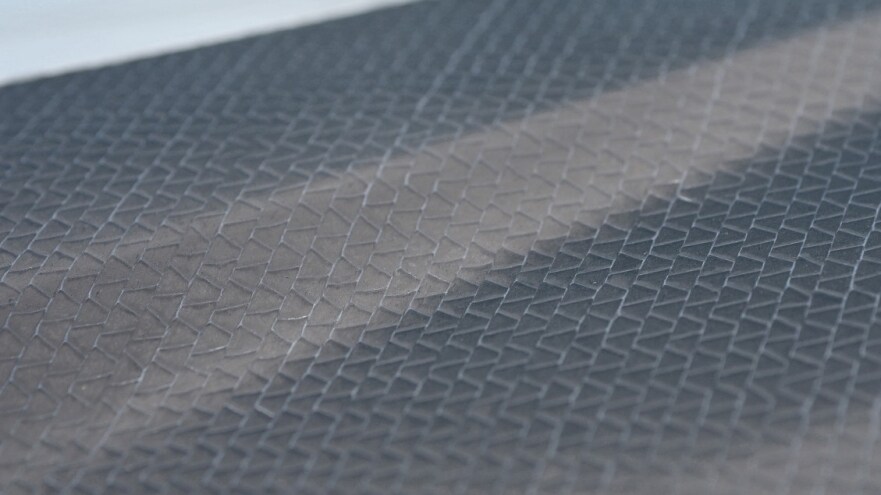- Ford announces a significant new collaboration to develop manufacturing innovations in automotive-grade carbon fibre
- Ford and DowAksa will be part of the U.S. Government-created Institute for Advanced Composites Manufacturing Innovation
- Innovation enables acceleration of Ford research and development of low-cost, high-volume carbon fibre; could reduce vehicle weight, increase fuel efficiency without sacrificing strength
- Ford last month revealed the all-new Ford GT supercar that makes extensive use of lightweight materials, including carbon fibre
Ford Motor Company announced a significant new collaboration to develop manufacturing innovations in automotive-grade carbon fibre for use in future products.
Ford and DowAksa are accelerating joint research to develop high-volume manufacturing techniques – aiming to make vehicles lighter for greater fuel efficiency, performance and capability.
The companies will be part of the newly formed Institute for Advanced Composites Manufacturing Innovation, created by the U.S. government. The institute is part of the larger National Network for Manufacturing Innovation supported by the U.S. Department of Energy.
“Our collaboration with DowAksa and participation in this organisation significantly boosts what we are able to achieve,” said Ken Washington, Ford vice president, Research and Advanced Engineering. “We have a true alliance of highly talented people working to take automotive materials to the next level.”
The mission of the institute and the goal of Ford’s collaboration with DowAksa – a 50/50 joint venture between The Dow Chemical Company and Aksa Akrilik Kimya Sanayii A.Ş. – is to overcome the high cost and limited availability of carbon fibre, while developing a viable, high-volume manufacturing process.
“This opportunity builds upon Ford’s current joint development agreement with Dow Chemical and accelerates our timeline to introduce carbon fibre composites into high-volume applications,” said Jim deVries, Ford global manager, Materials and Manufacturing Research. “This collaboration helps us accelerate our efforts to create lighter automotive-grade composite materials that benefit customers by enabling improved fuel economy without sacrificing strength.”
Ford and Dow Chemical began working together in 2012 to develop low-cost, high-volume carbon fibre composites. Also in 2012, the European Ford Research and Innovation Centre in Aachen, Germany, investigated new production processes to reduce cycle times for carbon fibre components through the Hightech.NRW research project.
Engineers in Aachen work closely with their colleagues in the U.S. on a wide range of projects involving advanced materials and carbon fibre, including collaborative research into corrosion and corrosion-fatigue analysis of joints with metals supporting the use of carbon fibre-reinforced plastic parts in mixed material bodies.
“DowAksa’s technology and manufacturing expertise will help effectively overcome barriers to entry for the use of carbon fibre composites in high-volume automotive applications,” said Douglas Parks, DowAksa board member and a primary participant in the founding of the Institute for Advanced Composites Manufacturing Innovation. “The new institute provides a collaborative platform to accelerate our progress.”
Carbon fibre composites have been used in aircraft and racing cars for decades because they provide high strength with extremely low weight. It is possible to tailor strength properties to a specific component – making it as stiff or flexible as needed for a given application.
Ford last month revealed the all-new Ford GT supercar that makes extensive use of lightweight materials, including carbon fibre and aluminium – enabling outstanding acceleration and handling with improved efficiency. With the broad application of structural carbon fibre elements, the GT will exhibit one of the best power-to-weight ratios of any production car.
“Our goal is to develop a material that can greatly reduce vehicle weight in support of improved fuel economy for our customers,” said Patrick Blanchard, Ford supervisor, Composites Group. “The flexibility of the technology allows us to develop materials for all vehicle subsystems across the product line – resulting in a weight savings of more than 50 per cent compared to steel.”
Creating lighter vehicles is a major part of Ford’s Blueprint for Sustainability to reduce fuel consumption and exhaust emissions. Current products that apply a light-weighting philosophy include Fiesta – which uses high-strength, lightweight boron steel. The all-new 2015 Ford F-150 uses high-strength, military-grade, aluminium alloy to help reduce overall weight by up to 300 kilogrammes – returning estimated fuel improvements of up to 29 per cent, depending on engine and driveline configuration on the combined cycle, along with best-in-class payload and tow ratings.
The Ford Lightweight Concept Fusion applied such lightweight materials as aluminium, high-strength steel, magnesium, composites and carbon fibre to nearly every vehicle system to reduce the car’s weight to that of a Fiesta – a near 25 per cent cut. Insights from this concept can springboard light-weighting technologies to a much larger scale of production.
Ford and DowAksa also are working together to reduce the energy needed to produce carbon fibre components, cut the cost of raw materials and develop recycling processes.

